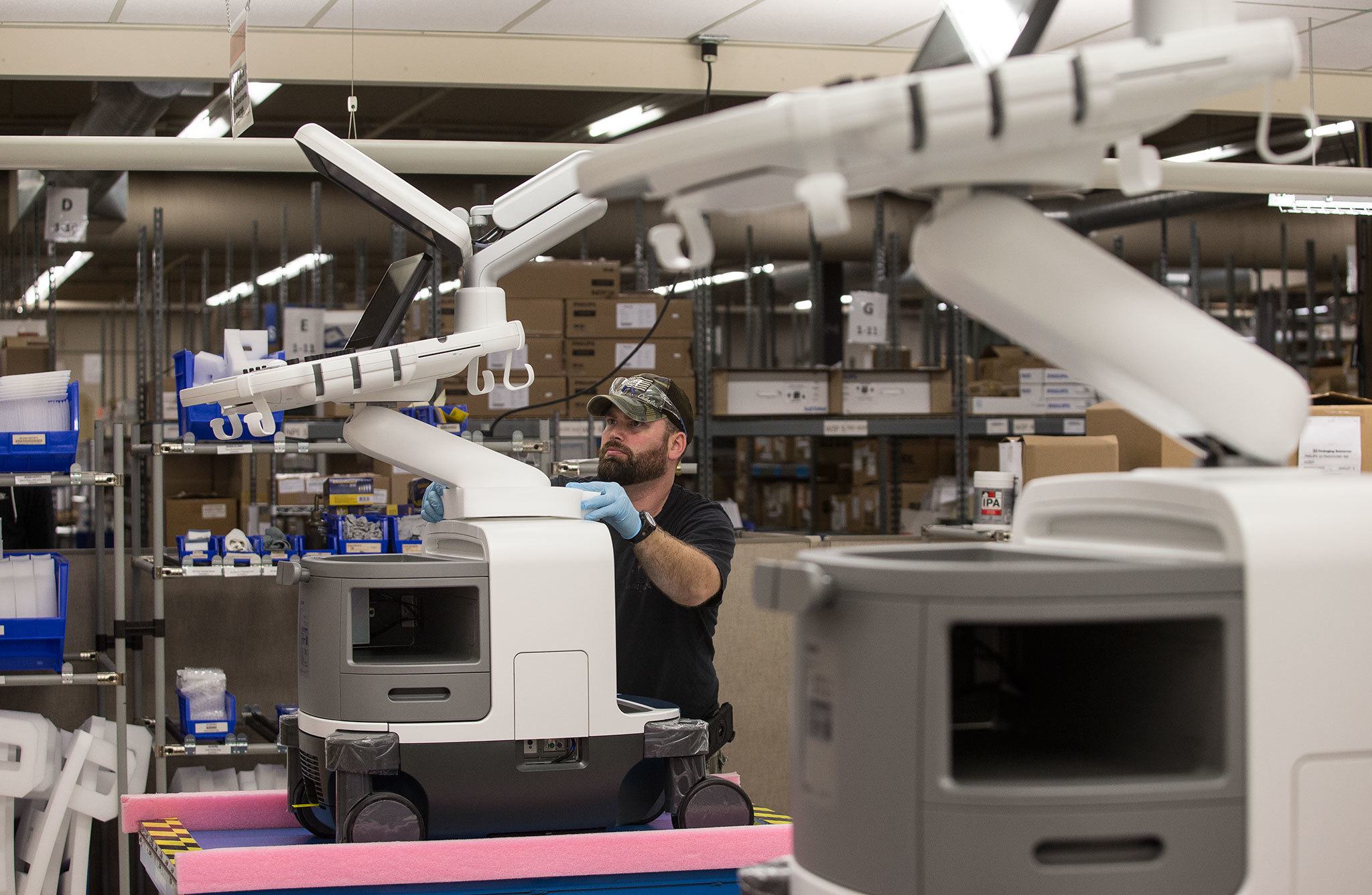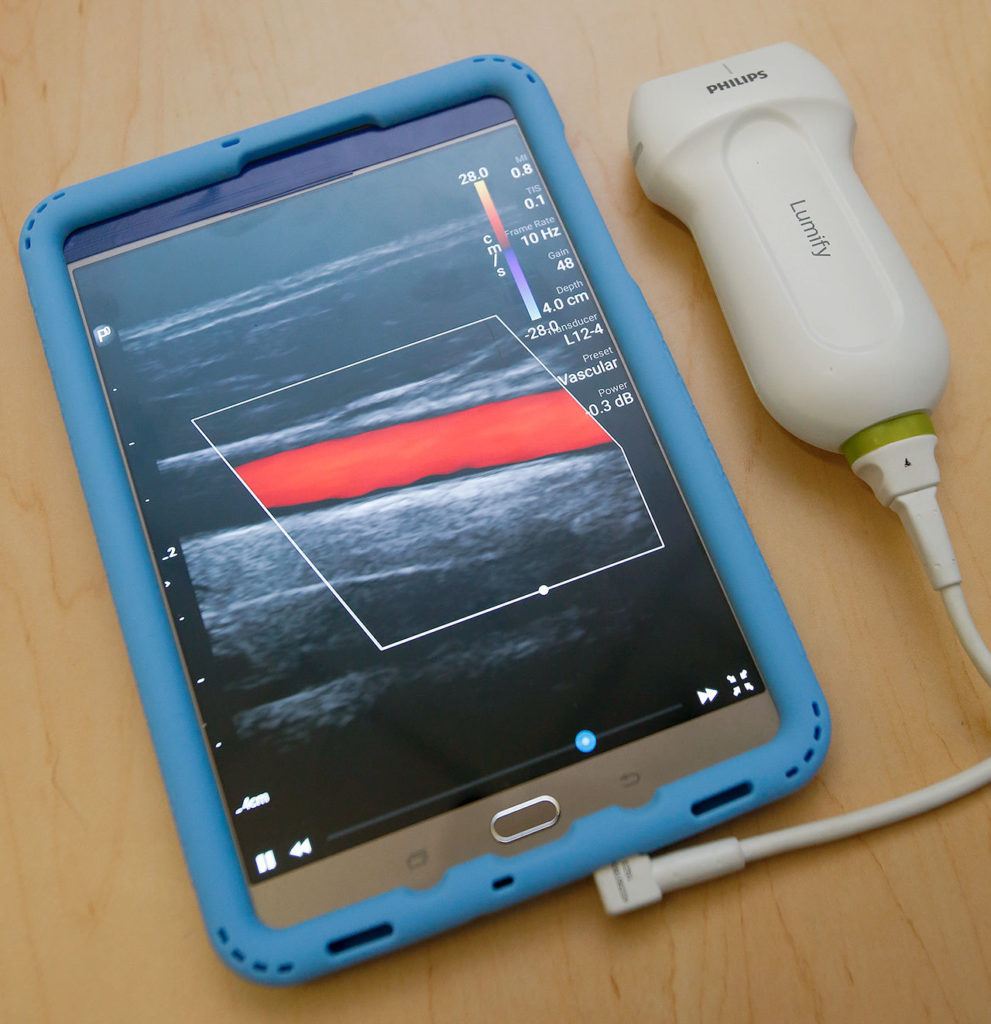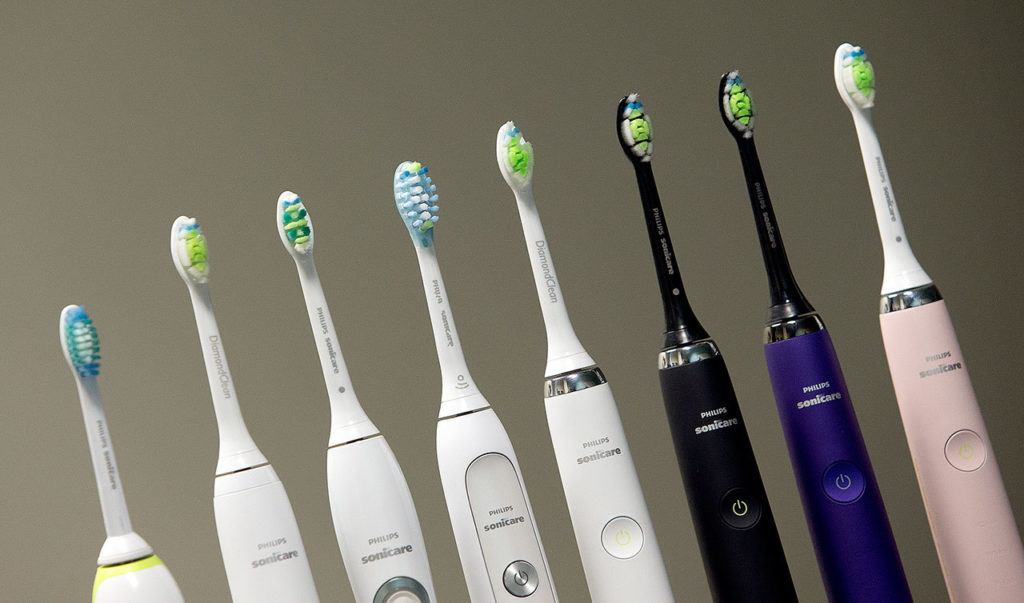Randy Hamlin came to see the importance of his work firsthand five years ago as he waited for medical treatment for ongoing knee pain.
Hamlin is vice president and business segment leader for the ultrasound point-of-care division at Philips in Bothell.
On the day of the procedure, the medical team included an interventional radiologist who arrived with an ultrasound machine.
“They wheeled in the ultrasound and I realized I’d worked on designing that model,” Hamlin said. “I teared up. It had a profound impact that I was being personally impacted by a product I helped create. I walked out thinking how much I love my company and what I do.”
Philips, a Netherlands-based global company, produces a wide range of health care and consumer products. Long known for their lightbulb and television products, Philips divested from those divisions in recent years to focus more toward health care.
“The company has recently gone through a substantial strategic shift. We’re excited to be part of the laser-beam focus on health care technology. That’s our future,” Hamlin says.
The redirect included a restructuring of Philips’ three Washington-based sites. All were relocated to the 8-acre Bothell site, which was already home to the ultrasound division.
The Emergency Care &Resuscitation group — designing and producing products such as defibrillators — was previously based in downtown Seattle. The Oral HealthCare group, which designs Sonicare, was located in Snoqualmie. The total Bothell workforce now numbers around 2,000 employees.
“Consolidating the team into one campus allows us to leverage our existing talent across completely different products,” Hamlin explains. “The Bothell ecosystem allows more cross sharing of technology and design.”
The Bothell ultrasound division is a juggernaut for Philips internationally and for Washington’s economy. Approximately 80 percent of all Philips ultrasound equipment shipped worldwide is manufactured in Bothell.
For Washington in 2015, ultrasound equipment ranked among the state’s top 10 exports at $703 million. The majority is attributed to Philips.
“The state of Washington and the Bothell/I-405 corridor are national centers and a brain trust for medical ultrasound equipment,” says Matt Smith, director of industry and resource development, Economic Alliance Snohomish County (EASC).
The EASC commissioned a study eight years ago which determined there were around 5,000 jobs related to medical device equipment in the greater Seattle region, with a concentration in Bothell, Smith said.
“Part of the benefit of having Philips in Bothell is that it contributes to the area’s economic diversification beyond aerospace. There is an entire industry (medical equipment) concentration in south Snohomish County that many people don’t recognize is even here,” Smith says.
In addition to its manufacturing capabilities, Philips’ Bothell site is a hub for research and design.
In November 2015, Philips launched Lumify, the world’s first app-based ultrasound device.
Users download the app to a smart device — such as a smartwphone or tablet — and connect the needed ultrasound equipment directly to the device.
Lumify was “heavily driven out of the Bothell division,” Hamlin said.
“We’re developing products that really facilitate lowering the costs of health care and taking better care of patients outside of just hospitals. We’re generally improving the quality of care and patient satisfaction,” Hamlin says. “It helps answer the need of how health care needs to transform.”
Bothell is also the de facto headquarters for Philips’ oral health-care division. Everything from design to marketing, commercialization and shipping happens for products such as the Sonicare toothbrush.
Similar to the ultrasound division, oral healthcare is employing a tech-forward vision.
New generation Sonicare brushes were developed in Bothell; they use built-in sensors and Bluetooth technology to monitor brushing times and techniques.
The information is logged online for easy reference by both consumers and their approved dentists. The information helps guide effective personal behaviors and professional treatment especially for children.
“With our focus moving towards becoming a health-tech company, Sonicare is kind of of the crown jewel of what Philips wants to be,” says Brent Kokoskin, senior director, Philips Oral Healthcare. “We provide products within the professional medical sphere for diagnosis and treatment, but also to consumers to achieve healthier living at home.”
Both Hamlin and Kokoskin cite formal and informal connections to regional institutions as key to Philips’ successful Bothell base.
“Software is such a strong attribute in the region from players like Amazon, Google and Microsoft. That really helps source an engineering demand and keeps our ultrasound industry fully supported with the needed technology and innovations,” Hamlin says. “It helps keep us strong and is critical as we continue to grow.”
Philips also collaborates with institutions such as the University of Washington.
Hamlin cites a “tight relationship” with the UW Medical Center. Philips funds employees’ onsite work and research collaborations. The oral health-care division offers multi-year internships to UW Foster School of Business post-MBA students.
“There is a great talent pool for us to pull from thanks to the high-quality educational institutions in Washington state,” Kokoskin says. “This region is a hotbed for creative thinking and innovation. We bring to bear that expertise and competency for Philips.”
Philips also draws on and contributes to the local community through ongoing philanthropy. Philips has been a partner of the Seattle/King County Clinic since its inaugural 2013 event.
The four-day event provides free medical, dental and vision care to those in need. Nearly 4,500 patients were treated during the October event, with more than $3.9 million in free care.
Patients arrive from across the state, with nearly 30 percent coming from Snohomish County in 2015.
While the Seattle Center Foundation is the lead organizer, the event is funded through corporate and individual donors as well as grants and in-kind contributions. Philips is a major supporter. In 2016, they provided X-ray, ultrasound and EKG machines and 2,000 Sonicare toothbrushes.
“Philips has been an amazing partner since the beginning,” says Julia Colson, project director, Seattle/King County Clinic. “A lot of times patients might be able to get an annual physical exam, but as soon as they need testing beyond that they’re unable to afford it.
“The equipment Philips provides is some of the most sought after at the clinic. It’s tremendous.”
Additionally, Philips employees are allowed to volunteer at the event on paid time. The company invited Colson and her colleagues to tour the Bothell campus and solicit volunteers.
The Seattle/King County Clinic requires nearly 4,000 volunteers to make the event happen. Kokoskin participated in 2015.
“An engaged and happy workforce is more effective and efficient,” Kokoskin says. “Events like the clinic allow employees to connect to the community, contribute and see firsthand the results of their work. It reinforces the immediacy of healthcare.”
Philips designs, manufactures and ships equipment worldwide from Bothell. Their economic impact in terms of profit and jobs can be measured, but their community involvement soars above the bottomline.
“It means the world to have partners like Philips support the clinic and we regularly receive thank-you notes from patients,” Colson says. “We appreciate the actual resources Philips provides, but also the employee participation.
“They come to fully understand the meaning and benefit they’re providing through their work. Philips engages in a deep way that makes people feel seen and heard.”
Talk to us
> Give us your news tips.
> Send us a letter to the editor.
> More Herald contact information.



























